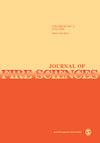An experimental case study of escooter fire in a four-story building
IF 1.9
4区 工程技术
Q2 ENGINEERING, MULTIDISCIPLINARY
引用次数: 0
Abstract
Driven by the necessity to understand the fire and smoke dispersion characteristics of electric bicycle (escooter) fires and their effects on residents’ safety in rural houses, this study was conducted to perform full-scale fire experiments in a village house in Hainan, People’s Republic of China. The tested building is a typical multi-story building representative of rural houses in southern China. It is found that an escooter fire grows rapidly once its lithium-ion battery is overcharged to ignite. Inside the stairwell where the escooters are parked, a significant increase in temperature over 60°C across all floors is observed and the maximum temperature reaches up to 800°C on the first floor. Furthermore, the propagation of smoke is fast, reaching the upper floors within 5 minutes and filling the entire building within 7 minutes. Due to stack effect, carbon monoxide concentration is the highest on the fourth floor, notably higher than the other floors. Closing the doors of rooms where occupants are typically present is found to effectively block heat and smoke transfer. Thus, in case an escooter’s lithium-ion battery undergoes explosion combustion, it is better that residents stay in rooms by closing or even sealing the doors, waiting for help during most of the fire period. However, in case the lithium-ion battery has not been burning, there still are chances for evacuation or putting out the flame.四层楼房中的逃生车火灾实验案例研究
为了了解电动自行车(电动代步车)火灾的火势和烟雾扩散特征及其对农村住宅居民安全的影响,本研究在中华人民共和国海南省的一栋农村住宅中进行了全面的火灾实验。实验建筑是中国南方农村典型的多层建筑。实验发现,一旦锂离子电池充电过量起火,escooter 的火势会迅速蔓延。在停放电动代步车的楼梯间内,所有楼层的温度都显著升高了 60°C 以上,一楼的最高温度可达 800°C。此外,烟雾的传播速度很快,5 分钟内就能到达高层,7 分钟内就能弥漫整栋大楼。由于烟囱效应,四楼的一氧化碳浓度最高,明显高于其他楼层。关闭通常有住户的房间的门可有效阻止热量和烟雾的传播。因此,如果电动代步车的锂离子电池发生爆炸燃烧,居民最好呆在房间里,关闭甚至封死房门,在火灾的大部分时间里等待救援。不过,如果锂离子电池没有燃烧,仍有机会疏散或扑灭火焰。
本文章由计算机程序翻译,如有差异,请以英文原文为准。
求助全文
约1分钟内获得全文
求助全文
来源期刊

Journal of Fire Sciences
工程技术-材料科学:综合
CiteScore
4.00
自引率
0.00%
发文量
14
审稿时长
2.5 months
期刊介绍:
The Journal of Fire Sciences is a leading journal for the reporting of significant fundamental and applied research that brings understanding of fire chemistry and fire physics to fire safety. Its content is aimed toward the prevention and mitigation of the adverse effects of fires involving combustible materials, as well as development of new tools to better address fire safety needs. The Journal of Fire Sciences covers experimental or theoretical studies of fire initiation and growth, flame retardant chemistry, fire physics relative to material behavior, fire containment, fire threat to people and the environment and fire safety engineering. This journal is a member of the Committee on Publication Ethics (COPE).
 求助内容:
求助内容: 应助结果提醒方式:
应助结果提醒方式:


